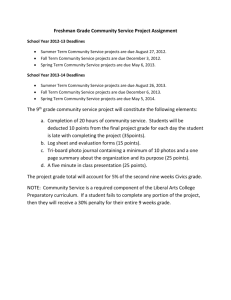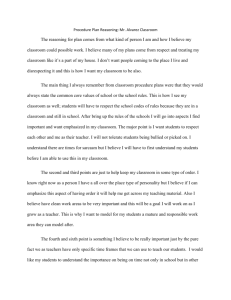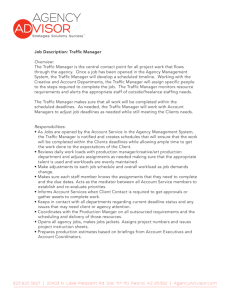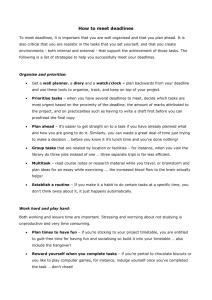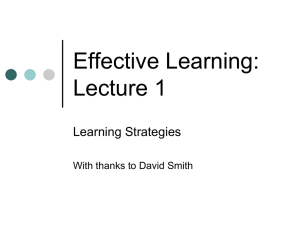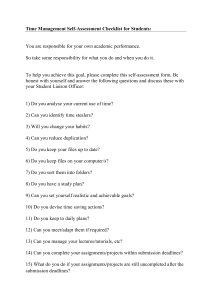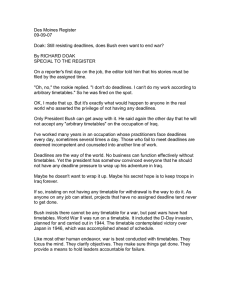THE OFFICE OF ACADEMIC SUCCESS PROGRAMS WEEKLY
advertisement
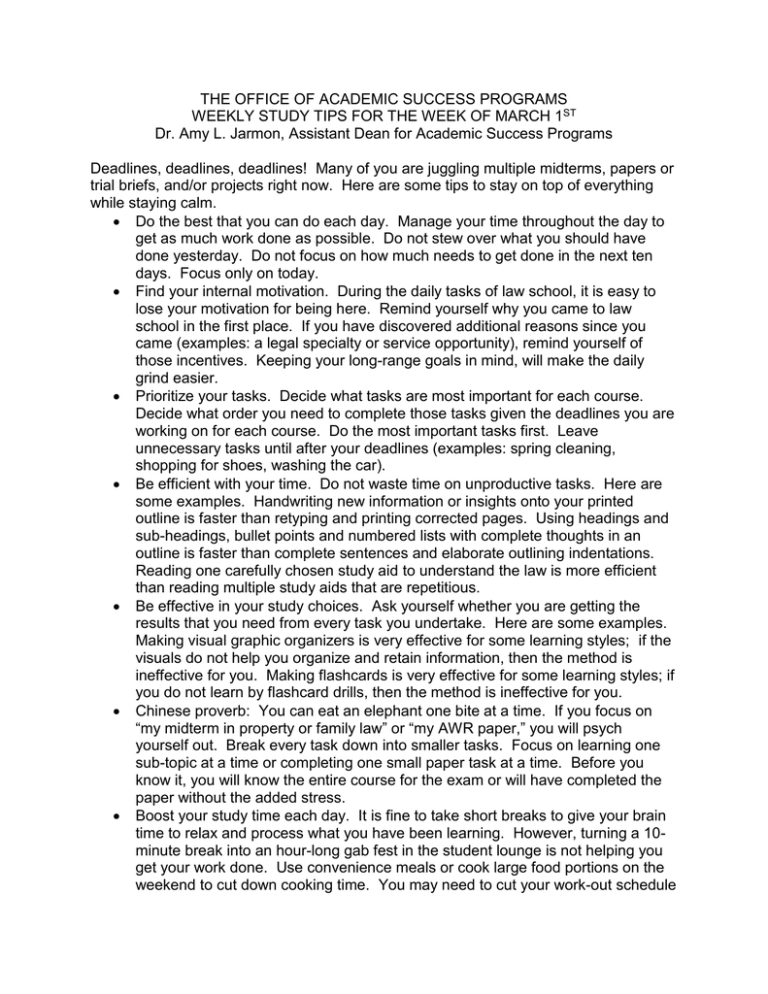
THE OFFICE OF ACADEMIC SUCCESS PROGRAMS WEEKLY STUDY TIPS FOR THE WEEK OF MARCH 1ST Dr. Amy L. Jarmon, Assistant Dean for Academic Success Programs Deadlines, deadlines, deadlines! Many of you are juggling multiple midterms, papers or trial briefs, and/or projects right now. Here are some tips to stay on top of everything while staying calm. Do the best that you can do each day. Manage your time throughout the day to get as much work done as possible. Do not stew over what you should have done yesterday. Do not focus on how much needs to get done in the next ten days. Focus only on today. Find your internal motivation. During the daily tasks of law school, it is easy to lose your motivation for being here. Remind yourself why you came to law school in the first place. If you have discovered additional reasons since you came (examples: a legal specialty or service opportunity), remind yourself of those incentives. Keeping your long-range goals in mind, will make the daily grind easier. Prioritize your tasks. Decide what tasks are most important for each course. Decide what order you need to complete those tasks given the deadlines you are working on for each course. Do the most important tasks first. Leave unnecessary tasks until after your deadlines (examples: spring cleaning, shopping for shoes, washing the car). Be efficient with your time. Do not waste time on unproductive tasks. Here are some examples. Handwriting new information or insights onto your printed outline is faster than retyping and printing corrected pages. Using headings and sub-headings, bullet points and numbered lists with complete thoughts in an outline is faster than complete sentences and elaborate outlining indentations. Reading one carefully chosen study aid to understand the law is more efficient than reading multiple study aids that are repetitious. Be effective in your study choices. Ask yourself whether you are getting the results that you need from every task you undertake. Here are some examples. Making visual graphic organizers is very effective for some learning styles; if the visuals do not help you organize and retain information, then the method is ineffective for you. Making flashcards is very effective for some learning styles; if you do not learn by flashcard drills, then the method is ineffective for you. Chinese proverb: You can eat an elephant one bite at a time. If you focus on “my midterm in property or family law” or “my AWR paper,” you will psych yourself out. Break every task down into smaller tasks. Focus on learning one sub-topic at a time or completing one small paper task at a time. Before you know it, you will know the entire course for the exam or will have completed the paper without the added stress. Boost your study time each day. It is fine to take short breaks to give your brain time to relax and process what you have been learning. However, turning a 10minute break into an hour-long gab fest in the student lounge is not helping you get your work done. Use convenience meals or cook large food portions on the weekend to cut down cooking time. You may need to cut your work-out schedule from 2-hours every day to fewer days and/or shorter hours per day. If you are an upper-division law student who is employed part-time, consider asking your employer for shorter hours for a week or two. If you save just ½ hour each day for a week, you have recaptured 3 ½ hours. Continue preparing for class. The short-term gain of not reading will become a long-term pain. You will not understand the material as well; you will be less discerning in class for note-taking; and you will be back-logged on outlines and review. Use your weekends to advantage for getting ahead a bit in your reading so that you are still prepared. Get help if you need it. If you are confused about your course material for a midterm exam, talk to your professor. If you are worried about your organization for a writing assignment, talk to your professor. If you are a 1L, the Tutors and Teaching Fellows are also there to help you. Struggling by yourself to alleviate the confusion only increases your stress level. Realize when your stress is due to the fact that you have not been consistently working throughout the semester. It is much more stressful to delay outlining and reviewing until a couple of weeks before an exam. After these immediate deadlines, start to outline and review weekly for every course so that you will not have the same overwhelming amount to learn and the same high stress before the final exams. Use wise stress management. Sleep at least seven hours per night – you will be more alert, more productive, and better able to retain information. Eat three nutritious meals a day – your body needs fuel. Get ½ hour of exercise three times a week – you do not need to do 2-hour workouts for a boost. Avoid mega caffeine and sugar hits in your diet – the later crash and possible health effects are not worth it. Practice relaxation exercises (pick up an Office of Academic Success Programs handout). Read inspirational quotes or scriptures. Avoid pessimistic and grouchy colleagues. Phone friends and family who love you. Laugh out loud. Laughter is good medicine. It improves your outlook and nurtures your soul.
